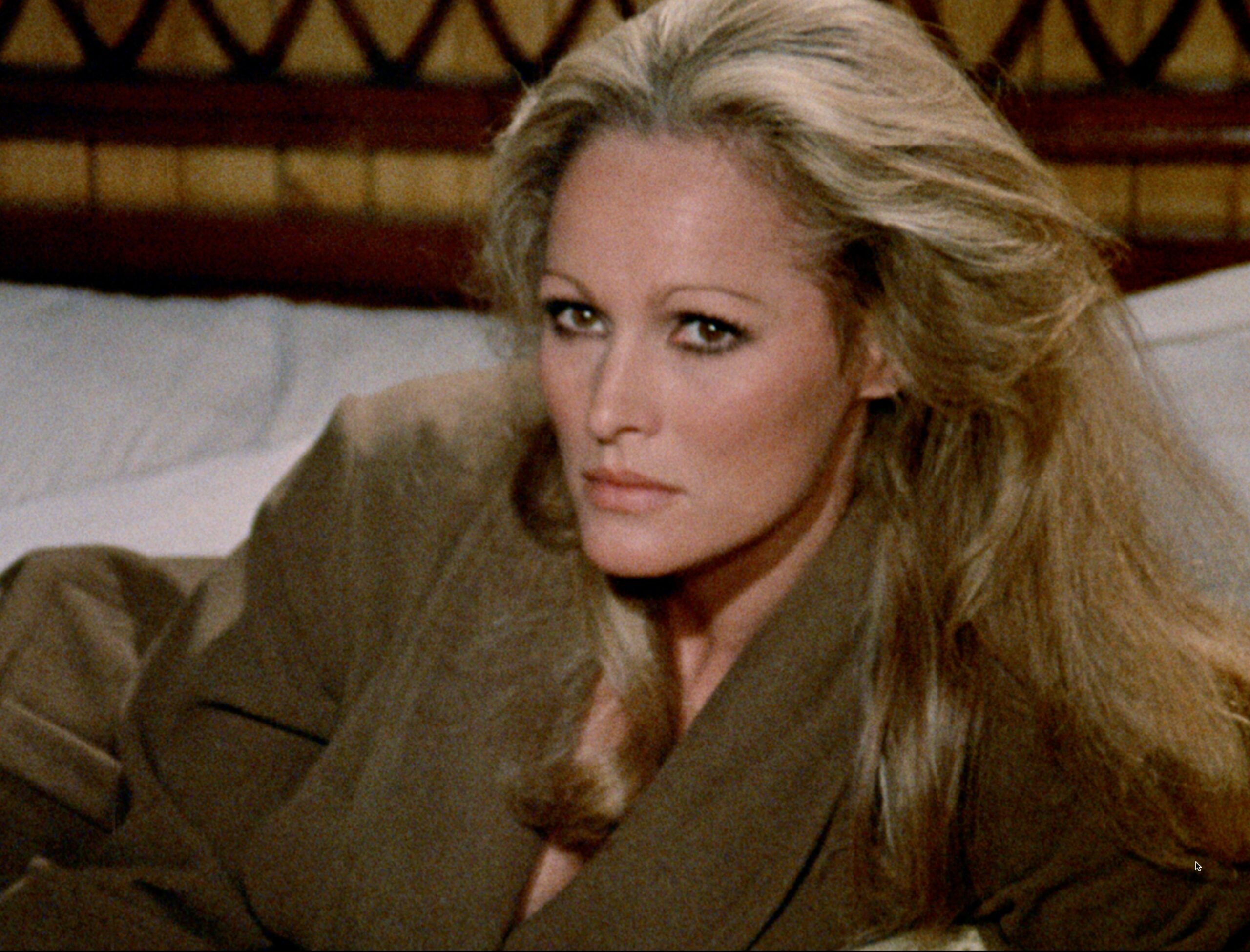
Among the many films produced in the boom of Italian popular cinema during the early 1970s, Stateline Motel occupies a curious and distinctive place. Shot largely in Quebec, directed by the versatile Maurizio Lucidi, and starring a cast that drew from Hollywood, Cinecittà and beyond, it is at once a heist thriller, a psychological chamber piece and a noir tinged with the ambiguities of the giallo. Long overlooked, its restoration sheds new light on Lucidi’s craftsmanship and the film’s enduring, snow-bound allure.
Stars Across Borders
Few ensembles embody the contradictions of 70s cult cinema as clearly as Stateline Motel: glamorous, dangerous, international. At its centre is Ursula Andress, immortalised in Dr. No, here as Michelle, the motel owner’s wife whose beauty and inscrutability tilt every balance of power. Opposite her is Fabio Testi, fresh from a run of Eurocrime and poliziottesco hits, as the thief on the run who finds himself fatally drawn into her orbit. Their chemistry was palpable, and with good reason: as Testi admits in a new interview, their romance began on set and continued for four years. Eli Wallach adds grizzled weight, bringing with him the menace of his Leone roles, though Lucidi made the unusual choice to conceal his famously piercing gaze behind spectacles, a decision Testi still calls “controversial.” And in an early but memorable role, Barbara Bach lends the film a youthful glamour that foreshadows the international profile she would achieve later in the decade with The Spy Who Loved Me.
From Heist to Noir
Adapted from Franco Enna’s novel Last Chance, the film opens with spectacle: a robbery, a fatality, and a prolonged chase across snowbound highways with Fabio Testi at the wheel of a Studebaker. It is a bravura set-piece, but the film’s real interest lies elsewhere. Once the action subsides, the focus shifts to the interiors of the motel, where suspicion, desire and betrayal become the true engines of the story.
As Davide Pulici notes in the featurette Last Chance Motel, Lucidi was less concerned with the fireworks of crime cinema than with its psychological undercurrents. A former editor, he shot with the cut in mind, shaping scenes with a precision tuned to rhythm and mood. At times the film verges on the giallo, but its fatalism is unmistakably noir.
Filming on Thin Ice
Shot far from Cinecittà in the frozen backroads of Quebec, the production demanded resilience from cast and crew alike. In our exclusive interview, Fabio Testi recalls both the hazards and the camaraderie of early 70s location filmmaking. Isolated by freezing conditions, the production wrestled with the same brutal cold that seeps into every frame. With no stunt crew to rely on, Testi performed most of the driving himself, including one sequence where failed traffic control led to a head-on collision that destroyed a camera rig!
Lucidi’s enthusiasm sometimes carried him beyond caution. In one sequence, he asked Testi to drive a Studebaker in a zigzag across an iced road. When the actor refused, Lucidi took the wheel himself and promptly skidded off the track. Such stories underline his reputation as what Testi calls a “craftsman of cinema”: a resourceful professional, inventive, fearless, and deeply committed to his production.
There was gossip on set too. Ursula Andress was then with Ryan O’Neal, who showed up on set, fresh from Love Story, and tried offering her acting tips. The crew weren’t impressed. Within a few days he was gone, leaving Andress behind, and opening the door to a four-year affair with Fabio Testi that outlasted the film itself.
Lucidi in Context
Maurizio Lucidi is today remembered primarily for The Designated Victim (1971), but his career is deserving of wider attention. As Pulici notes in Discovery of an Unsung Master, Lucidi’s background in editing gave him an instinctive command of rhythm and structure. He worked across westerns, war films, thrillers and comedies, rarely settling into a single genre, but often demonstrating a clarity of craft and a willingness to foreground actors.
In Stateline Motel these qualities are plain: the international cast is carefully balanced, the Canadian locations exploited for both spectacle and claustrophobia, and Bacalov’s score deployed with an editor’s precision. What emerges is a hybrid film, distinct from the poliziotteschi of Di Leo or Lenzi, closer in temperament to noir, but also marked by the ambiguities of Italian genre cinema in the early 1970s.
Restoration and Release
Shameless’ Blu-ray release marks the first time the film has been presented uncut, in its longest version, and in English. Restored in 2K, the disc includes:
- The Right Chance: Interview with Fabio Testi – the star reflects on working with Ursula Andress and Eli Wallach, the challenges of filming in snowbound Canada, and the on-set romance that spilled into real life.
- Discovery of an Unsung Master: A profile of Maurizio Lucidi by Davide Pulici – an appreciation of Lucidi’s career, from his roots in editing to his eclectic run of thrillers, westerns and noirs, positioning him as a craftsman deserving rediscovery.
- How Stateline Motel Got Made by Davide Pulici – a production history charting the journey from Franco Enna’s novel to the Canadian shoot, revealing how international financing and location choices shaped the film’s distinctive character.
- Two alternate openings, presented via seamless branching
- Restored English audio and brand new English subtitles/SDH
For decades, Stateline Motel was a marginal entry in Eurocrime history, hard to find and easy to overlook. This new restoration allows it to finally be seen for what it is: a distinctive noir, shaped by Lucidi’s editor’s eye, enlivened by a remarkable cast, and enriched by the kind of behind-the-scenes stories that only deepen its fascination.
Stateline Motel [Blu-ray, Region Free] is released 29 September 2025.

FACEBOOK
Join us on facebook for announcements. sneak peaks and more
follow us
TWITTER
We tweet about films, upcoming releases and other interesting offers
follow us